We’re always encouraged to drink more water but drinking directly from the tap may not always be the safest move. To ensure that you and your family are consuming clean and healthy water, it is recommended for you to install a water filter in your home. Water filters not only improve the flavour of your water, but it also removes impurities such as rust particle and harmful bacteria or viruses.
Although bottled waters are quick and convenient solution, water filters are much more sustainable – and will even save you money in the long run. However, one thing that Malaysian market does not lack of is the number of water filters available.
There are even countless types of water filters that work in different ways such as under-sink filters, faucet attachments, whole-house filtration systems, pitcher filters, and more.
To help you get started on your hunt for the perfect water filter, we have prepared a buyer’s guide and even reviewed some of the best water filters available on the market.
Related Articles That You Might Find Helpful:
- Best Water Heater in Malaysia (2023 Review)
- Best Water Dispenser in Malaysia (2023 Review)
- Best Water Pump in Malaysia 2023
Types of Water Filters
There are different types of water filters and they can be used at almost every point of your water’s journey through your home. Here are a few types of water filters:
Whole-Home Filtration Systems
These type of water filters will filter all the water coming into your home that is also a water softener to remove minerals from your water. It is well known that hard water is bad for your pipes and water fixtures, so investing in a whole-house water filtration system makes more sense to protect your pipes. However, this type of water system is also often more expensive and time-intensive to set up.
Under-Sink
If you’re looking for something to filter out contaminants and to make your drinking water taste better, then a point-of-use filter is a good option worth considering. These can be filters attached to the sink or under the sink from where you get your drinking water. Under-sink filters are often easier to install than whole-home systems but they can also be slightly more expensive than faucet attachments or pitcher type water filters.
Faucet Attachments
Similar to under-sink filters, faucet attachments provide users with instant access to filtered water right where you usually get their drinking water, such as the kitchen sink. These types of filters are easy to install and can typically be attached to most standard sinks.
However, do note that they won’t work with unique sink setups such as pull-down faucet with spray nozzle. A faucet attachment will only filter the water you want to drink and allow you to continue using unfiltered water for washing dishes.
If you don’t require advanced filtering systems and only need an extra layer of filter to improve drinking water taste, then this should be sufficient. This type of water filter system even puts less pressure on the filter by filtering only the water you drink, this means it will last longer and does not require filter replacements as often.
Pitchers
Pitchers are not as convenient as sink filters as they need to be refilled frequently, but pitcher filters are great for allowing you to chill your filtered water. It’s also extremely easy to set up. Some may find faucet attachments a little too bulky and unnecessary, especially if you often wash dishes or hands at that sink. Pitchers are able to filter your drinking water for taste without getting in your way of other tasks.
Countertop
Countertop water filtration systems operate like faucet filters by diverting water from the sink into a filtration system with its own tap. However, countertop filtration needs to be filled and can also act like water coolers. While they’re bulkier than pitchers, countertop filters offer the advantage of allowing you to place filtered water anywhere in your home.
Types of Filtration Methods
Sediment Filtration
Sediment filtration is commonly used to remove physical sediments such as sand, dust, heavy metals, rust, and other large particles. This is a common filtration system that’s used for residential, commercial, and even industrial purposes. However, do note that this is a physical filter and does not remove chemicals or smaller contaminants.
Activated Carbon Block Filtration
This type of filtration involves fine carbon powder that is bound together with a binding agent. The activated carbon effectively removes chlorine, odor, chemicals, and lead. This step helps to deodorize the water, but it does not remove viruses, minerals, and dissolved solids.
Granular Activated Carbon (GAC) Filtration
This is similar to the activated carbon block mentioned above where it removes odor, chemical, chlorine, and lead. But instead of fine carbon powder, this type of filter uses loose carbon granules to provide a stronger water filtration flow rate.
Reverse Osmosis Filtration (RO)
A RO membrane is utilized in this method to separate inorganic pollutants from water. This step produces the purest water available by removing everything (including minerals) from the water, except some chemicals, chlorine, and VOCs. This is the most expensive filtration type and also produces the most wastewater in the process.
Ultraviolet (UV) Disinfection
UV is used to kill microorganisms such as viruses and bacteria.
Ultrafiltration (UF)
A submicron semipermeable UF membrane is used to push water through at a high force via the hydrostatic method to filter out most contaminants, even particles as small as 0.001 microns.
Alkaline/Water Ionizers
This type of water filter uses electrolysis to charge water plates and segregated into alkaline and acidic water. Alkaline water is used for consumption and cooking while acidic water is suitable for washing face and cleaning purposes.
Buyer’s Guide – What to Consider when Buying a Water Filters in Malaysia
There are thousands of water filters on the market and picking one out can be extremely confusing, which is why it is important for you to know what you want before going out shopping. Here are a few factors that you need to take into consideration when going out shopping for a new water filter.
Purpose
Obviously, the main purpose of getting a water filter is to get cleaner water, but what we mean here is the type of particles you hope to remove from the water. National Water Service Commission (SPAN) has actually certified that Malaysia’s tap water is safe to consume, but some will still want to get a water filter to improve taste or remove hard minerals.
There are also a few other more advanced models that can help filter out even more dangerous contaminants such as lead or possibly man-made chemicals that are present in our water. Those with old pipes or those who live in an area where clean water is not easily accessible may want to invest in a high-quality water filter to remove such particles.
Even if you live in an area where municipal water is safe to consume, you may still have contaminants leaching into your water through old pipes. Adding a water filter will help remove such impurities as well as hard metals and chlorine.
Independent Certifications
Considering how important effective filtration is since it’s so difficult to tell if it’s even working the way it should, one reliable way to know it’s working the way it claims to be is by checking their certifications. There is no one-size-fits-all certification and it’s important to know what exactly you want removed from your water. Generally, the more certifications a filter has, the more contaminants it can remove.
You should also watch out for confusing jargons such as “filters made to standard”. This simply means that they’ve created it according to their standards but does not mean they’re independently tested and certified.
Capacity
The next thing to consider is your household’s water consumption as this will affect the type and size of water filter you get. Those living in a dorm or a small apartment will do well with a small pitcher, but those with larger households or if you prefer to filter larger amounts of water for cooking and drinking, then you may want to consider either a faucet or under-sink filters.
Replacement Filters
On top of your water filter unit, you’ll also need to look at how much the replacement filters cost. A water filtration system is really only as good as its filters, do you need to factor this fact into your decision and find out how much the replacement filters cost, their availability, as well as how often they need to be replaced.
Budget
Finally, you’ll need to know how much budget you have for your water filter. Premium water filtration systems can easily cost thousands of ringgits or, they can also be much cheaper with basic filtering capabilities.
There are no issues with getting an affordable water filter for personal use but do make sure to check out for certifications. You should not only consider the cost of the water filter but also take a look at how long the unit needs to be replaced before making the final decision.
Top 11 Best Water Filters in Malaysia
Now that we’ve covered some basic information on water filters, let’s go straight into our top picks for the best water filters you can get for your home now.
1. Panasonic Water Purifier TK-CS10
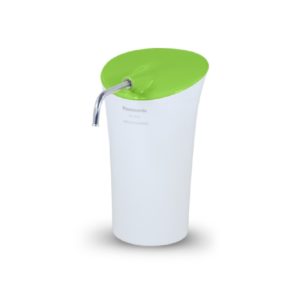
The Panasonic Water Purifier TK-CS20 delivers 6.0L of filtered water per minute and is perfect for an average-sized household. This is a popular water filter that’s also one of the more affordable options in Malaysia.
The water filter uses non-woven fabric filters that offer exceptional filtration performance in removing larger and coarse particles of dirt. The filter also has a layer of activated carbon that has an outstanding self-cleaning effect and is effective in absorbing harmful substances such as rust and mold. It is also certified to remove 95% of chlorine present in the water.
Aside from that, the water purifiers also has a large capacity of 6.5L and long cartridge life of 12,000L before it needs to be replaced. It also comes in a compact and stylish design to match modern kitchens without taking up too much space. Setting this unit up is also a piece of cake. All you need to do is to connect it directly to the kitchen faucet and you’re done!
Pros
- 6.5L capacity suitable for average-sized households.
- Compact and modern design.
- Long cartridge life with cartridge life checker.
- Non-woven fabric and activated carbon filter.
Cons
- Possible water leakage occurrence.
2. Aquaphor Crystal Eco Under Sink Water Filter
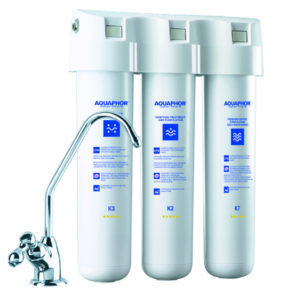
Looking for an under sink water filter that gives you safe, clean water without causing an eye sore? Then the Aquaphor Crystal Eco Under Sink Water Filter may be your cup of tea.
This water filter is designed with CarbFiber cartridge K3 that has granulated activated coconut carbon to filter particles up to 5 microns as well as to remove active chlorine, organic compounds, and heavy metals from your water.
Next, the water goes through a hollow fiber membrane to filter out particles as small as 0.1 micron and provides up to 99.99% protection from bacteria. The final step of treatment conditions your water by adding silver active ions.
All of these technologies are created to help remove sediment and harmful substances found in tap water such as chlorine, lead, bacteria, hormones, and annoying odor to leave cleaner, clearer water that taste better too. The filter also pushes out 2.5 liters of freshly filtered water per minute directly from the tap to keep your whole family hydrated.
In addition to that, it features a Push & Tech technology to make changing the cartridge as simple as 1, 2, 3. To change the cartridge, you only need to hold the stop button and rotate the cartridge clockwise to insert a new one and rotate it counterclockwise till you hear a click.
All-in-all, this is an amazing and easy-to-use under sink water filter that won’t take up precious kitchen countertop space while still delivering clean and healthy water for all to drink. Many have also commented how much they love the slim design that leaves them more storage space for other stuff under the sink.
Pros
- Easy maintenance.
- Advanced filtration system.
- Under-sink design.
- Slim and compact profile.
Cons
- None
3. Waterborn Stainless Steel Master Outdoor Water Filter
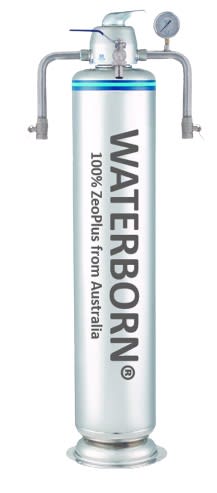
The Waterborn water filter is imported from Australia and is an excellent outdoor water filter that ensures clean, filtered water for the entire household. The Master Outdoor Water Filter has a sturdy stainless steel body with a bigger base for stability. This means that you won’t have to worry about it rusting or toppling onto the ground rain or shine.
The outdoor water filter is also known for inhibiting the growth of ammonia and chloramines in water and is also able to effectively remove chlorine odor in water that leads to skin and eye irritations. The ZeoPlus grains provide excellent mechanical filtration of suspended particles and is also capable of filtering smaller particulates by catching them within its microporous structure and surface irregularities.
Furthermore, the water filter is also extremely low maintenance. All you need to do is to turn the MVP handle to “backwash” and the filter unit will automatically flush out all the sediments until the filter is clean. Then turn the handle to “rinse” to ensure the filtered water coming out of the unit is clean.
Pros
- Sturdy stainless steel design with a wide base.
- Low maintenance.
- Good for removing chlorine odor.
- ZeoPlus grains ensure excellent filtering performance.
Cons
- Might require another filter unit for drinking purposes.
4. Xiaomi Mi Mijia Faucet Water Purifier
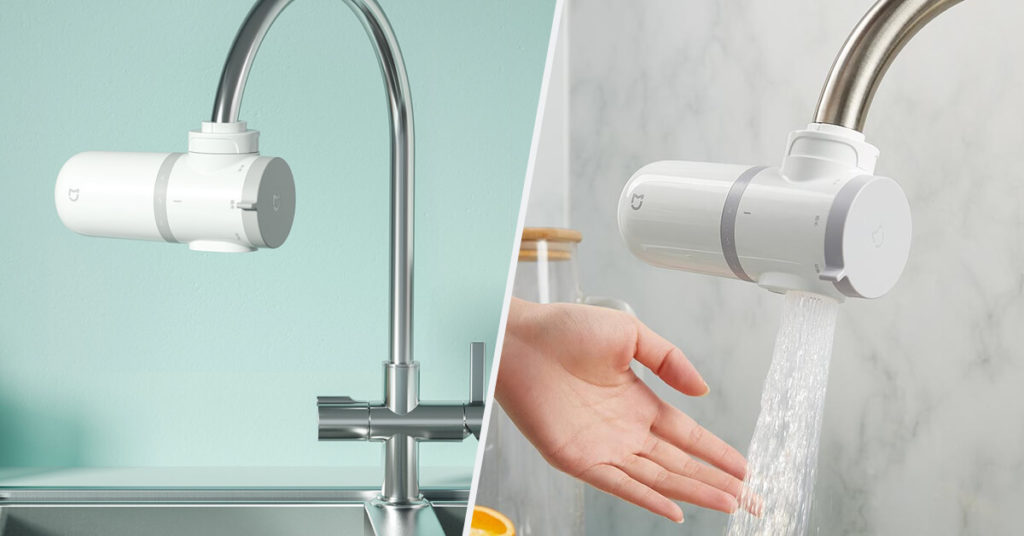
Those who are worried about a complicated installation that involves multiple sets of water purification equipment will love the Xiaomi Mi Mijia Faucet Water Purifier. This is one of the simplest water filters out there with a super easy installation process.
Although this faucet water purifier may not be as effective as other purifiers with advanced technology, the Xiaomi Mi Mijia is convenient, simple and fast. Plus, it does not need to be punched and connected to electricity to work. Inside the water purifiers are four filter elements.
The first layer of the purifier is a stainless steel filter to remove large particles of impurities such as sediments and dirt. The second layer is a non-woven filter to filter smaller particles such as rust and microbial debris. Nest is a granular activated carbon with high adsorption performance to remove colloids, residual chlorine, and other pollutants. The final layer is a hollow fiber ultrafiltration membrane to filter out bacteria and to help water retain beneficial substances.
The water purifiers has three outlet methods, purifier water, raw water, and shower. Purifier water is suitable for cooking, boiling water, drinking, and washing face; raw water for washing dishes and the shower option is great for washing vegetables and fruits.
One drawback to this water purifiers is that the filter element is only useful for up to one year under normal use, which means you will have to replace it regularly. If you use it often, you may have to increase your filter replacement frequency.
Pros
- Simple installation without electricity.
- 3 water outflow modes.
- Four filter elements.
Cons
- Might need to replace filter element frequently.
5. Joven JP200 Series Water Purifier
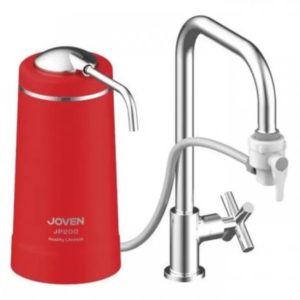
Joven JP200 Series Water Purifier offers an ergonomic and sleek design that doesn’t turn into an eyesore when placed in your kitchen. The key feature of this water purifier is that it comes with 3 layers of non-woven fabric filter and powdered activated carbon to remove 99.9% chlorine, sediment, rust, odor, and turbidity from your tap water.
The water purifiers has three types of connections: kitchens ink, wash basin and direct plumbing. You can also easily choose between filtered and unfiltered water simply by turning the lever at the tap to select the valves. The 2-function selector valve is great for allowing you to continue using unfiltered water for washing dishes and cleaning up while the filtered water is great for drinking.
Furthermore, the outlet pipe is made from stainless steel material so you can enjoy drinking rust-free clean water for a long time before needing to worry about rust particles forming inside.
Pros
- Ergonomic and sleek design.
- 2-function valves for you to choose filtered and unfiltered water.
- 3 layers of non-woven fabric filter and powdered activated carbon.
- Stainless steel outlet pipe.
Cons
- Low water pressure
6. Sawyer Micro Squeeze Mini Water Filter
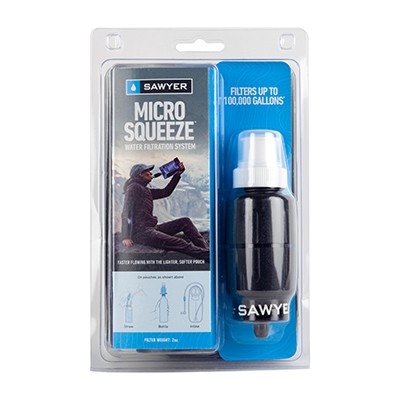
Frequent backpackers will love how convenient the Sawyer Micro Squeeze Mini Water Filter is that will quickly become one of the most essential tools on your adventures. This water filter is a 2 oz / 57 g hollow-fiber membrane water filter that can remove bacteria and protozoa from water. This little device lets you enjoy clean and safe drinking water wherever you go with the ability to remove 99.99999% of bacteria.
At 57g, this water purifier is extremely light and very portable. It is also designed to be compatible with water bottles with 28mm threads which is the typical size thread used by disposable bottles. The way to use this filter is to fill up the bag or bottle with water, screw on the filter and squeeze the water through the filter to drink. It’s incredibly easy and portable to bring with you anywhere.
Though the Sawyer Micro Squeeze Mini Water filter produces a decent flow rate it diminishes quickly as you use it over time, especially if you’re often filtering very dirty water. Though you can backflush the filter to clean it, this will only slow the clogging over time and not stop it altogether.
Overall, this mini water filter lets you drink directly from the water source and may also help reduce the need for purchasing bottled water while travelling, thus saving the environment one step at a time.
Pros
- Light and portable.
- Filters up to 99.9999% bacteria and lets you drink directly from source.
- Suitable for backpacking and travels.
Cons
- May clog overtime.
- O-ring may get damaged easily.
7. LifeStraw Personal Portable Water Filter
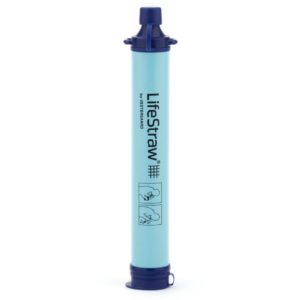
Similar to the Sawyer water filter reviewed above, the LifeStraw Personal Portable Filter lets you pick up water from puddles and other water sources and drink directly from them. The one thing it does differently is that it operates by suction force and it will take some effort for you to get water from the ground into your mouth.
The Lifestraw Personal Filter is a great option for solo on-the-go use and the lightweight design makes it even more attractive to bring along on travels or adventures. The water filter uses a hollow fiber filtration cartridge with 0.2-micron pore size to filter out particulates, bacteria, and protozoa.
While this filter does not require any set up, it will take up a lot of effort to drink through it. You’ll need to suck with all you’ve for the first few seconds before you get to enjoy any water through it. If the water is murky, this will get even harder, and the flow will decrease significantly.
Nonetheless, the LifeStraw Water Filter has been tested to be extremely durable to be able to withstand harsh outdoor conditions. This is a great travelling partner for those who enjoy venturing outdoors.
Pros
- Unlimited shelf life.
- Lightweight.
- Easy to clean.
Cons
- Takes some effort to drink through it.
- Long design might snap easily.
8. Panasonic TK-AS45 Alkaline Water Ionizer
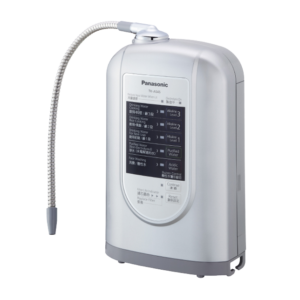
There are many reasons to drink alkaline water, some of which includes improving metabolism, slows down aging, and reduce gastric problems. With that in mind, it is not surprising to see more and more people buying alkaline water filter for their homes. One of the best alkaline water purifiers available is the Panasonic TK-AS45.
The TK-AS45 water ionizer offers you multiple levels of pH settings to choose from. pH 8.5 is recommended for drinking water to alleviate feeling of heaviness and discomfort in stomach. It also improves gastrointestinal movement.
You can choose to use pH 9.5 for cooking food as the alkaline ionized water permeates food to extract flavour and make the feed more tender. Aside from alkaline water, the water ionizer can also dispense weak acid water such as pH 5.5 which is perfect for skin.
The alkaline water purifiers has 4-stage filtration system (non-woven fabric, ceramic, activated carbon, and hollow fiber membrane) to remove residual chlorine and impurities from tap water before it is electrolyzed by a high-powered electrolyzer with 5 electrodes to create alkaline ionized water and acidic ionized water.
The Panasonic Alkaline Water Ionizer features an at-a-glance control panel that lets you get your desired water with just a simple press. All the settings are available on the control panel in multiple languages. It even has a lamp to inform you of the remaining filter life and when a replacement is required. The water purifiers comes with a user-friendly water switching lever that lets you switch between purified water, unpurified water, and shower water.
Overall, the Panasonic TK-AS45 Alkaline Water Ionizer is one of the best in the market for transforming tap water into healthy alkaline water that’s free from musty odor and harmful contaminants.
Pros
- Produces alkaline water at different pH levels.
- Purification capacity of 12,000 litres.
- 4-stage filtration system.
- Easy-to-use control panel with convenient features.
Cons
- Expensive.
9. Xiaomi Mijia Reverse Osmosis Water Purifier
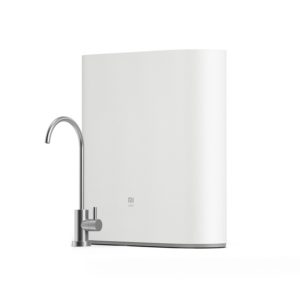
The Xiaomi Mijia Reverse Osmosis Watre Purifier is an effective compact device that can filter out chlorine odour, sediments, cysts, chemicals, lead, and dissolved solids. The water purifiers features 4-stage filtration system consisting of PP cotton filter, preposition activated carbon filter, RO filter, and coconut shell position activated carbon filter.
The PP Cotton is designed to remove large particles such as sediments and rust while the granular activated carbon effectively eliminates odor and chlorine. The RO filter removes dissolved antibiotics, organic matter, heavy metals, nitrite, and bacteria present in the water. Finally, the filtered water goes through a second granular activated carbon layer to improve water taste.
The water purifiers features a compact and slim design and can be placed in the children’s room, study room, bedroom, bathroom, and living room. On top of a convenient design, changing the filter replacement is also very easy and will only take seconds to finish.
One of its major selling points is that the water purifier can be connected to your smartphone to check its performance and be reminded on when to replace the filter. The Xiaomi Mijia Reverse Osmosis Water Purifier is an amazing water purifying device that provides clean, filtered water for your family anywhere.
Pros
- Can be monitored via smartphone.
- 4-stage filtration system.
- Easy to maintain.
- Compact and small design.
Cons
- None.
10. Beulife 3.5L Drinking Water Purifier & Pitcher
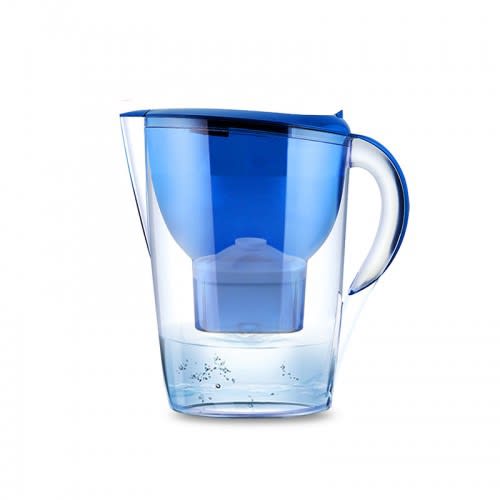
Installing water filters might be a hassle since it might involve new pipe connection and possibly a new electrical point if your kitchen counter doesn’t already have one. To cut the fuss and still enjoy sipping on filtered water, you can consider getting a handheld water purifier and pitcher such as the Beulife instead. This filter pitcher does not require installation and works amazing at filtering out the nasty stuff from your tap water.
Since it’s so handy and convenient, this filter pitcher is suitable for both home and office use. It features a 3-layer filtration process to produce healthy water that’s free from heavy metals and pollution particles. It also has a large 3.5L drinking water volume so you won’t have to keep refilling the jug.
The 3-layer water filtration cartridge includes the PP fiber filter which is the outer layer of the fiber filter structure used to filter pollution particles, red worms, rust, sand & dirt. The next layer is the resin filter where an ion exchange process percolates the water through a bead-like spherical resin material to soften and deionize the water. The final step is the activated carbon filter to remove odor and chlorine.
One drawback to using this pitcher is that the filter replacement needs to be replaced every 60 days. If you’re worried that you’ll forget, the pitcher has an LCD display timer that counts down the 60 days, so you’ll know when to change the filter.
Pros
- No installation required and easy to use.
- Handheld, portable device that is suitable for home and office use.
- 3-stage filtration process for clean water.
- LCD display timer.
Cons
- Water takes awhile to be filtered.
- Filter replacement needs to be changed every 60 days.
11. 3M Outdoor Water Filter AP902 Whole House Filtration
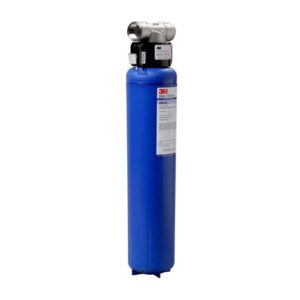
Now we’re back to yet another whole-house filter that ensures only filtered, clean water goes through your pipes at home. 3M Purification is a market leading filtration company with many years of experience in the industry, so you know their product is nothing short of reliable.
The 3M AP902 filter is a relatively small and compact device that doesn’t take up a whole lot of space. Installation is easy but it may involve adding new piping, and if you’re not familiar with that, it is recommended for you to leave it to the professionals to do it.
The filter is a single cartridge system that is able to consistently provide high quality water for the whole house at a respectable 20 gallons per minute flowrate. In fact, this unit is suitable for larger homes and even light commercial applications. The filter is NSF and ANSI Standard 42 and 53 certified to reduce taste and odor, particulates, chloramine, chemicals, lead, pesticides, and cysts.
One thing, however, is that the 3M AP902 does not filter the chlorine and for good reasons. Water is often stored in tanks above our house that’s not protected against possible contamination, so the chlorine is kept in the water to fight off diseases and harmful bacteria.
In terms of maintenance, the AP902 has a Sanitary Quick Change (SQC) design feature that lets you quickly swap cartridges without having contact with the filter media. This is not only easy to use but it also ensures that your filter does not get contaminated. Overall, this is a compact whole-house filtration system that’s easy to use and can significantly improve water quality in your house.
Pros
- Made from pr-grade stainless steel.
- Easy to clean and maintain.
- High flow rate.
- NSF and ANSI Standard 42 and 53 certified.
- Compact design.
Cons
- Does not filter chlorine.
FAQ
Why Should You Get A Water Filter?
Although the tap water in Malaysia is generally safe to consume with regular monitoring of particle levels based on global quality standards. The pipes that connect the water source to your homes may not be in tip-top condition. Pipes that are hundreds of years old may be dirty, rusty, and possible moss build-up. These could introduce harmful contaminants in your tap water.
Hence. having a reliable, quality and good water filter for your home is important for your health, especially if you live in a house with old piping. Before deciding on which water filter to go for, you should first understand your needs. We hope today’s guide and best water filters review has given you enough information to determine which best water filter to buy for your home.
Are water filters the same as water purifiers?
The functionality of a water filter is meant to remove waterborne protozoa and bacteria from the water, but not viruses. Whereas the functionality of a water purifier removes protozoa, bacteria and also viruses. Thus, providing a higher level of protection. But both water filters and water purifiers serves the same purpose which is to provide a clean and healthy water for us to consume.